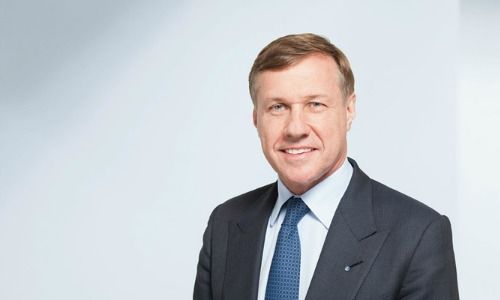Suicide Highlights Swiss Highwire Act
The apparent suicide of former Zurich Insurance CEO Martin Senn highlights how Swiss top executives are struggling to juggle an increasingly competitive and global workplace with a still insular Swiss culture.
Martin Senn was found dead of a gunshot wound on Friday in a holiday apartment in Klosters, a ski destination of the rich and famous. His suicide came less than six months since losing his job as Zurich's CEO after the insurer hit troubled waters.
At Zurich, Senn had reached the summit of his career: named as investment chief of the Swiss insurer in 2006 after stints at UBS and Credit Suisse, he was rewarded with the top job in 2010, having successfully navigated the insurer through the financial crisis.
Senn took on an insurer which had prided itself on being a «boring» company again after an ill-fated foray into asset management which led to massive losses and fresh injections of capital. But, four years into the job, Senn and Zurich were rocked by the suicide of its chief financial officer, Pierre Wauthier, who left a note blaming the insurer's chairman for ushering in an intolerable level of work and performance pressure.
Rising Pressure on Senn
Late in 2014, pressure on Senn and his executive team mounted, with investors purportedly unhappy with the company's lack of dynamic growth, presence in faster-growing markets, and strategic objectives. Senn had «2015 to deliver, otherwise it's going to be difficult for him,» an insider told finews.ch at the time.
However, Wauthier's suicide highlighted a key conflict: an apparently hard-charging, demanding performance culture more often found at Wall Street investment banks and seemingly at odds with that of a risk-averse Swiss insurance company.
It also highlighted the divide between Switzerland's consensus-based culture, where top-management decisions are often a formality after executives reach an agreement behind the scenes, and an Anglo-Saxon one which fosters open debate, even when it tips into heated confrontation.
Swiss in Conflict With Hard-Charging Executive Culture
Switzerland, a small country but economic powerhouse, has inevitably had to lean heavily on foreign talent for top jobs: a majority of Switzerland's largest companies – members of the benchmark Swiss Market Index – are led by non-Swiss executives like Nestle's Paul Bulcke, a Belgian, or Novartis boss Joe Jimenez, an American.
Top Swiss executives like Senn, UBS boss Sergio Ermotti – who flourished at Merrill Lynch, which was known for fostering lively and often heated debates in its top ranks – as well as Julius Baer CEO Boris Collardi and Swiss Re head Christian Mumenthaler are among those to juggle the demands of an increasingly competitive workplace with the sheer smallness of the country itself.
Failure Not an Option
Top Swiss executives who fall prominently, such as UBS Chairman Marcel Ospel, the public face of the Swiss bank's dramatic near-collapse in 2008, become pariahs in Swiss society: they effectively relinquish the right to take part in public or civic life as a result of their failure.
Rolf Hueppi, former Zurich CEO and author of the ill-fated financial-services strategy, is also persona non grata in Swiss society. After leaving Zurich in 2002, Hueppi and his U.S.-born wife spent most of their time in Virginia breeding horses. Hueppi, who later formed Swiss microinsurance holding company Paralife, eventually left Switzerland for Nassau in the Bahamas.
Unlike in the U.S., where stumbles are likely to be framed as part of a learning curve and which is geographically vast enough for a failed business career to get a fresh start elsewhere, Swiss business circles are small. And failure is a stigma which simply isn't easily forgiven, especially from a firm so closely linked with Switzerland's identity like Zurich, headquartered in a prominent Art Nouveau-style mansion on Lake Zurich.
Little Use for Fallen Executives
Switzerland's business community has little use for executives who fall as swiftly and as publicly as Senn did: they typically don't get asked to lecture at prominent universities, nor are they otherwise sought-after public speakers. Senn had few civic or other engagements outside Zurich, barring a role as a trustee of Lucerne's annual music festival.
But as the Zurich insider predicted, 2015 was Senn's year to win or lose, and it proved calamitous, professionally, for the CEO. Cash-rich Zurich abandoned a multi-billion pound bid for British rival RSA in September and flagged an unexpected quarterly loss as its stock sagged and after an embarrassing miscalculation of premiums.
Public Humiliation
Senn resigned two months later, but the suddenness and tone of his resignation – after ten very intense years with Zurich as Chairman Tom de Swaan temporarily took power – made clear that he had been left with little choice.
According to the insurance correspondent of «Neue Zuercher Zeitung», a journalist who knew Senn for 20 years, the former CEO recently had admitted in private that he was having trouble finding his feet after leaving Zurich. An executive who had made his career by moving around for work including long stays in the U.S. and Asia, Senn seemed lost after being found wanting at Zurich.





















